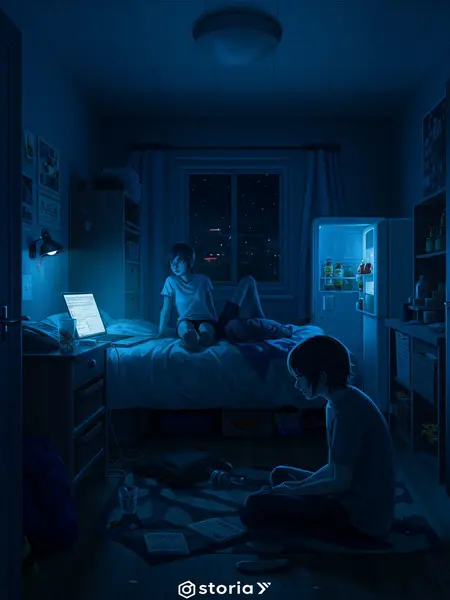Chapter 1: The Second Beginning
Ye Wendy opened her eyes to find herself back in her family’s living room, her freshman year of college replaying like a vivid dream she couldn’t shake. Sunlight spilled across the carpet, dust motes swirling in the air, while the familiar scents of stale coffee and fresh printer paper grounded her in a world she both loved and dreaded.
By the door, one of her father’s grad students hovered, awkward and unsure, shifting a worn backpack from one shoulder to the other. The hum of the old air conditioner mingled with the scent of burnt toast from the kitchen—a backdrop to the chaos of daily life in the Ye household.
He cleared his throat. "Hey, I’m William Young. Professor Ye’s my advisor."
William stuck out his hand, a nervous half-smile tugging at his lips, eyes darting to the framed diplomas above the couch. His handshake was earnest—firm, but not too strong. It was the sort of sincerity that would have made her fall in love with him once.
A sudden tremor ran through Ye Wendy’s hand as she took his. For a heartbeat, she clutched her notebook to her chest, flashes of their life together—and the moment she ended it—stabbing through her mind like cold lightning. She wondered: did he remember any of it too?
She scanned his face for a spark of recognition, her heart thudding in her chest. The future felt like a bruise, tender and aching, just beneath the surface.
"Have you heard of Blue Ridge?" she asked, voice clipped and urgent.
William blinked, then shook his head, looking more puzzled than intrigued.
He shrugged, glancing at his scuffed white Chuck Taylors. "Nope. Should I have?" His tone was light, like she’d just asked about a basketball score.
So, he wasn’t a key player—no trace of the past in his eyes.
Ye Wendy retreated to her room, closing the door behind her. On the desk sat a neat stack of lined paper—her thesis, "Possible Energy Interfaces within the Solar Radiation Layer and Their Reflective Properties," prepped for the Astrophysical Journal. Coffee stains already marked the margins. In the hallway, her mom’s voice drifted in and out, NPR murmuring from the kitchen radio.
She shook her head, dropped the thesis in the trash, and scrawled a new title at the top of a fresh sheet: "Spectral Analysis of Habitable Zone Planets in the Alpha Centauri Triple Star System."
Her hand trembled as she wrote, the pen scratching across the page. She paused, staring out the window where autumn leaves skittered past like old regrets, the quad glowing gold in the sun. Clarity and terror mingled inside her—she knew the consequences of every choice from here.
That fall, Ye Wendy convinced her father, David Ye, to start an applied physics research project. When one of David’s academic rivals began applying pressure, the family packed up and moved to the Northwoods of Minnesota.
They packed the Suburban with sleeping bags, a box of Pop-Tarts, and her dad’s battered coffee thermos. Ye Wendy talked it up as a grand adventure, but the reality was frostbitten mornings, school buses grinding over icy gravel, and her mom’s silent resentment simmering behind the bedroom door.
Linda Shaw soon began pulling away from David, handling divorce proceedings with a cold, businesslike efficiency.
It wasn’t dramatic—just legal papers, clipped phone calls, and boxes of old photos wedged between suitcases in the Suburban. Linda started taking her coffee black, her daily walks stretching longer along the frozen lake, her gaze distant.
One gray morning, Ye Wendy found her mother sitting at the kitchen table, staring at a stack of family photos while "American Top 40" drifted from the radio. Her coffee sat untouched, growing cold. Wendy watched from the hallway, guilt gnawing at her, but she didn’t go in.
All of this, Ye Wendy reminded herself, was part of her plan.
She watched her family come undone, a knot of guilt and determination tightening in her chest. The pain wasn’t an accident—it was a price. Here in the Northwoods, snow falling thick and silent, she would claim her own destiny.
She promised herself she wouldn’t return to Blue Ridge and press that button. Still, deep down, she knew that history’s randomness was just another form of fate.
She’d grown up reading American history textbooks, all domino effects and accidental heroes. Did anyone ever really break the pattern? Were her choices real, or just reruns with new actors?
All of human civilization’s progress, she thought, was built on accidents.
She remembered Mr. Alvarez, her AP U.S. History teacher, ranting about chaos theory—chalk dust flying, a poster of the Challenger shuttle taped to the wall. Every pop quiz felt like the pivot point of the universe.
Even if Blue Ridge’s Ye Wendy held back, someone else—Wendy Keller at Green Ridge or Purple Ridge—would press the button in her place.
The names changed—always American, always familiar. The cycles spun on, like monarch butterflies migrating or sitcoms looping late at night.
What she needed was to warn humanity, before it was too late.
She scribbled frantic notes in a battered Mead notebook, plotting out warnings she’d plant in journal articles, physics conferences, even radio call-in shows. It was the American way: try everything, hope something sticks.
But for reasons she knew too well, her warnings wouldn’t bear fruit for another ten years.
She closed her eyes, pressing her forehead to the cold glass, watching leaves skitter past like old regrets. Sometimes, fate felt as slow and relentless as a Midwestern winter.

